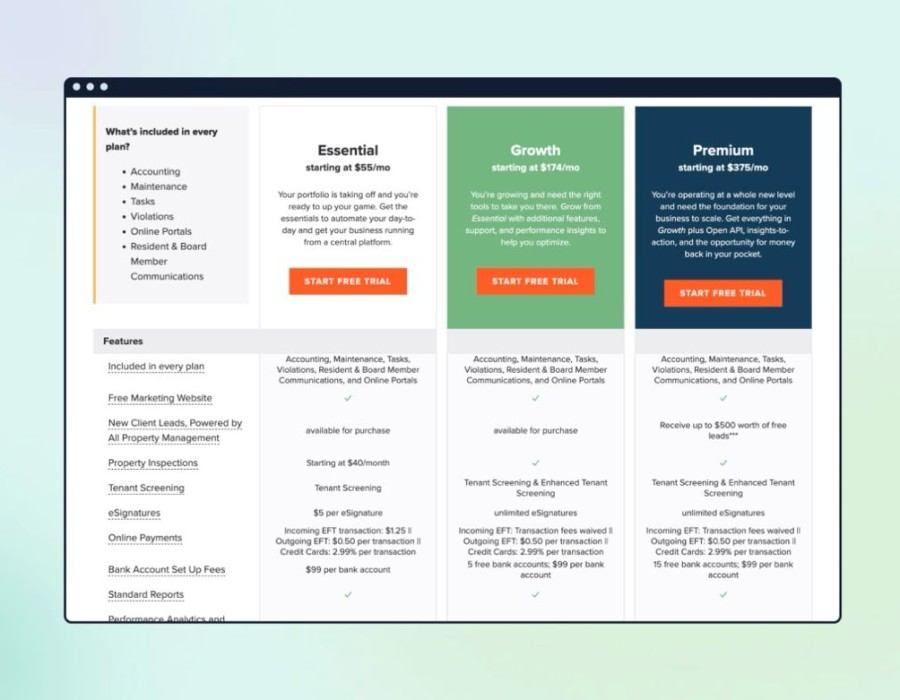Introduction
Navigating the complexities of property management can be daunting for small landlords who handle a limited number of properties. From ensuring timely rent collection to maintaining legal compliance through lease agreements, every task demands attention and precision. But what if these tasks could be managed more efficiently? In this guide, we explore tools and features that not only simplify the life of a landlord but also enhance tenant relations and property management efficacy. If you’re also curious about competitive options offering robust functionalities, this article is an excellent resource.
Essential Features of Property Management Platforms
Selecting the ideal property management software requires a clear understanding of the features that can truly benefit a small landlord. Here are key functionalities to look for:
- Adaptable Rental Applications: Customize applications to collect specific information from tenants, which streamlines the screening process and ensures better tenant fits.
- Lease Management Automation: Utilize tools that offer editable lease templates to ensure agreements are up-to-date with local regulations and tailored to specific property needs.
- Digital Rent Payment Systems: Implement systems that facilitate online rent payments, offering convenience to tenants and ensuring consistent cash flow for landlords.
- Maintenance Coordination: Software that provides an efficient system for logging and tracking maintenance issues can significantly ease the management burden.
These features not only assist in the operational handling of properties but also elevate the professionalism and effectiveness of a landlord’s management capabilities.
Advantages of Enhanced Communication Tools
Efficient communication forms the cornerstone of effective property management. Here’s how advanced communication tools can transform your management practices:
- Unified Messaging Systems: Platforms with built-in messaging capabilities keep all communications centralized, making it easier to manage and reference past interactions.
- Scheduled Alerts and Notifications: Use automated alerts to remind tenants about rent due dates or lease renewals, which helps in maintaining low delinquency rates.
- Document Management Solutions: Centralized storage for all lease agreements, transaction receipts, and maintenance records ensures that both landlords and tenants have easy access to important documents.
Incorporating these communication enhancements can significantly improve the responsiveness of a landlord’s operations and tenant satisfaction.
The Impact of Automation on Property Management
Automation introduces significant efficiencies in managing rental properties. Here are several automation features that can alleviate the workload for landlords:
- Automated Rent Collection: Systems that automate the billing and collection process can save landlords from the hassle of manual rent chasing.
- Streamlined Maintenance Requests: Automate the logging and assignment of maintenance work to save time and address tenant issues promptly.
- Efficient Tenant Screening: Leverage automated screening tools to quickly assess tenant applications based on predetermined criteria.
- Simplified Financial Tracking: Use automated financial tools for detailed tracking of income and expenses, facilitating easier financial oversight and planning.
Integrating these automation capabilities can substantially reduce the administrative overhead and enhance the effectiveness of property management.
Selecting the Ideal Property Management Tool
With numerous software options available, identifying the right tool can seem overwhelming. Consider the following criteria to guide your selection:
- User-Friendliness: Ensure the software is intuitive and easy to navigate, allowing you to manage properties without requiring extensive training.
- Customization Capabilities: Opt for software that allows customization to align with your property management style and requirements.
- Scalability: The tool should accommodate the growth of your property portfolio without requiring a system overhaul.
- Reliable Support and Robust Security: Adequate customer support and stringent security measures are critical for safeguarding your data and operations.
Evaluating these aspects will help you choose a software solution that not only meets your current management needs but also supports your business growth.
Conclusion
For small landlords, choosing the right tools to simplify property management is essential for enhancing operational efficiency and tenant relations. By prioritizing software that offers key automation features, robust communication tools, and scalability, you can transform your property management approach, resulting in a more organized and profitable business. Investing in the right tool will empower you to manage your properties more effectively and provide a superior experience for your tenants.






Comments